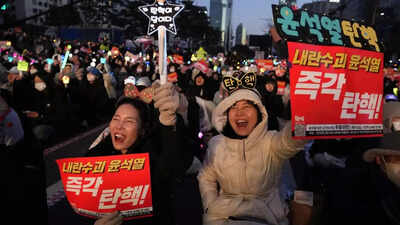
South Korean police are considering imposing a travel ban on President Yoon Suk Yeol as they investigate allegations of rebellion linked to his recent declaration of martial law. The brief imposition of martial law last Tuesday, which saw armed special forces deployed in Seoul, has triggered significant political upheaval in the country.
Despite an opposition-led attempt to impeach him in parliament on Sunday, Yoon managed to avoid suspension of his presidential powers, as ruling party lawmakers largely boycotted the vote, preventing the required two-thirds majority.
On Monday, Yonhap News Agency reported that police are weighing the possibility of barring Yoon from leaving the country during the investigation.
The main opposition democratic party has condemned Yoon’s martial law declaration as an “unconstitutional and illegal rebellion or coup.” It has lodged complaints with police against at least nine individuals, including Yoon and the former defence minister, accusing them of rebellion.
While sitting presidents generally enjoy immunity from prosecution, this does not apply to accusations of rebellion or treason. Prosecutors on Sunday detained former defence minister Kim Yong Hyun, who is alleged to have advised Yoon to declare martial law.
Authorities in South Korea also announced the suspension of three senior military commanders accused of involvement in imposing martial law. These individuals are among those implicated in rebellion allegations raised by the opposition.
On Saturday, President Yoon issued an apology for the martial law decree, acknowledging his legal and political accountability. He stated that his party would determine the path forward amid the nation’s political crisis, including decisions related to his presidency.
Since assuming office in 2022 for a single five-year term, Yoon has faced challenges in advancing his agenda due to an opposition-dominated parliament, along with low approval ratings and controversies involving himself and his wife. In his martial law declaration on Tuesday night, Yoon criticized the parliament, calling it a “den of criminals” obstructing governance, and vowed to eliminate “shameless North Korea sympathizers and anti-state forces.”






